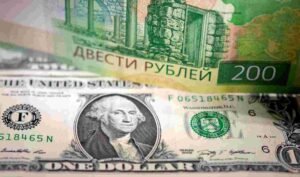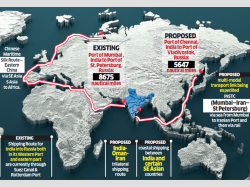Trade Relations Between India and Russia
In a remarkable turn of events, the trade relations between India and Russia has witnessed an extraordinary surge, reaching nearly $50 billion during the first three quarters of this year. The Russian ambassador, Denis Alipov, revealed this astounding statistic during a recent conference in the capital, highlighting a substantial growth of over 200% year-on-year in the first two quarters of the fiscal year 2024. This surge in bilateral trade can be attributed to the robust demand for hydrocarbons in India, primarily fueled by Moscow’s swift rise as the fourth-largest exporter to the country since the onset of the Ukraine-Russia war.
Defence and Oil: The Major Trades
A substantial portion of this trade expansion can be traced back to the exponential growth in India’s imports from Russia, particularly in the realm of oil. India’s oil imports from Russia surged nearly five-fold in the last financial year, reaching an impressive $46.2 billion. As Moscow solidifies its position as a key supplier of hydrocarbons to India, both nations are actively engaged in pursuing joint projects across diverse sectors, including defence, railways, petrochemicals, shipbuilding, and agricultural machinery.
Future Relations Between the Nations
Ambassador Alipov, optimistic about the future, expressed the anticipation of further growth, surpassing the figures of the preceding year. He outlined the collaborative efforts between India and Russia, emphasizing the ongoing pursuit of a free trade agreement between India and the Eurasian Economic Union. Additionally, the exploration of new trade routes such as the Eastern Maritime Corridor and the Northern Sea Route adds an exciting dimension to the deepening ties between the two nations.
However, amid the celebration of this economic alliance, the secretary of the Department for Promotion of Industry and Internal Trade, Rajesh Kumar Singh, injected a note of caution. While acknowledging the positive trajectory of increased trade, Singh underscored the need to address the skewed trade balance between the two countries. He pointed out that the indirect costs to Russia are comparatively lower, resulting in an imbalance that needs careful consideration.
India faced Trade Deficit
During the fiscal year 2023, India faced a substantial trade deficit of $43 billion with Russia. This deficit left Indian exporters with concerns as their Russian counterparts accumulated large surpluses in their Vostro accounts in India. In response to this, India has taken proactive steps to diversify its export basket to Russia, incorporating items such as pharmaceuticals, fertilisers, coal, diamonds, chemicals, and ceramics, among others.
Currency Adoption for Trade Relations
One of the intriguing facets of this burgeoning economic relationship is the mode of currency used in transactions. Indian refiners, in their dealings with Russian oil purchases, have adopted a mix of currencies, including the yuan. While there were previous discussions about trading in local currencies, this initiative has yet to take off due to concerns related to currency volatility and the persistently high trade deficit.
The surge in India-Russia trade is not merely a reflection of economic transactions; it symbolizes the deepening diplomatic and strategic ties between the two nations. The collaborative projects in crucial sectors like defence and railways exemplify the multifaceted nature of this relationship. As both countries navigate the intricacies of international trade, the exploration of new trade routes signifies a shared vision for the future.
The Eastern Maritime Corridor and the Northern Sea Route
The Eastern Maritime Corridor and the Northern Sea Route, highlighted by Ambassador Alipov, hold the promise of not only facilitating trade but also fostering a deeper understanding between India and Russia. These routes, by connecting the regions through maritime pathways, not only offer economic opportunities but also strengthen the geopolitical ties between the two nations.

The exponential growth in India-Russia trade is a testament to the resilience and adaptability of international partnerships. While celebrating the successes, it is crucial for both nations to address the challenges, particularly the trade imbalance, to ensure a sustainable and mutually beneficial relationship. The ongoing pursuit of a free trade agreement and the exploration of new trade routes signal a commitment to overcoming hurdles and building a robust foundation for future collaborations. As India and Russia continue to strengthen their ties, the world watches with anticipation, recognizing the significance of this evolving alliance on the global stage.











Comments 2